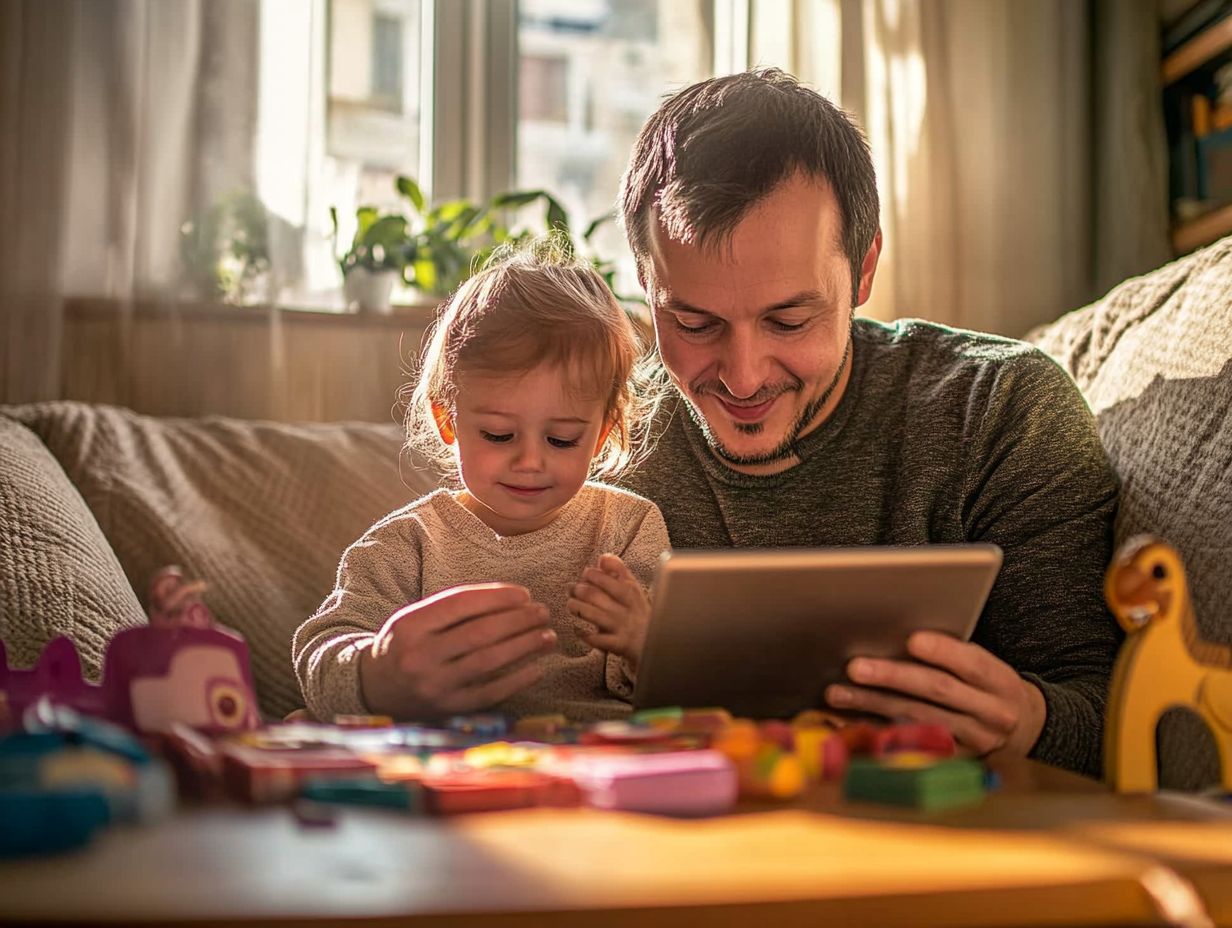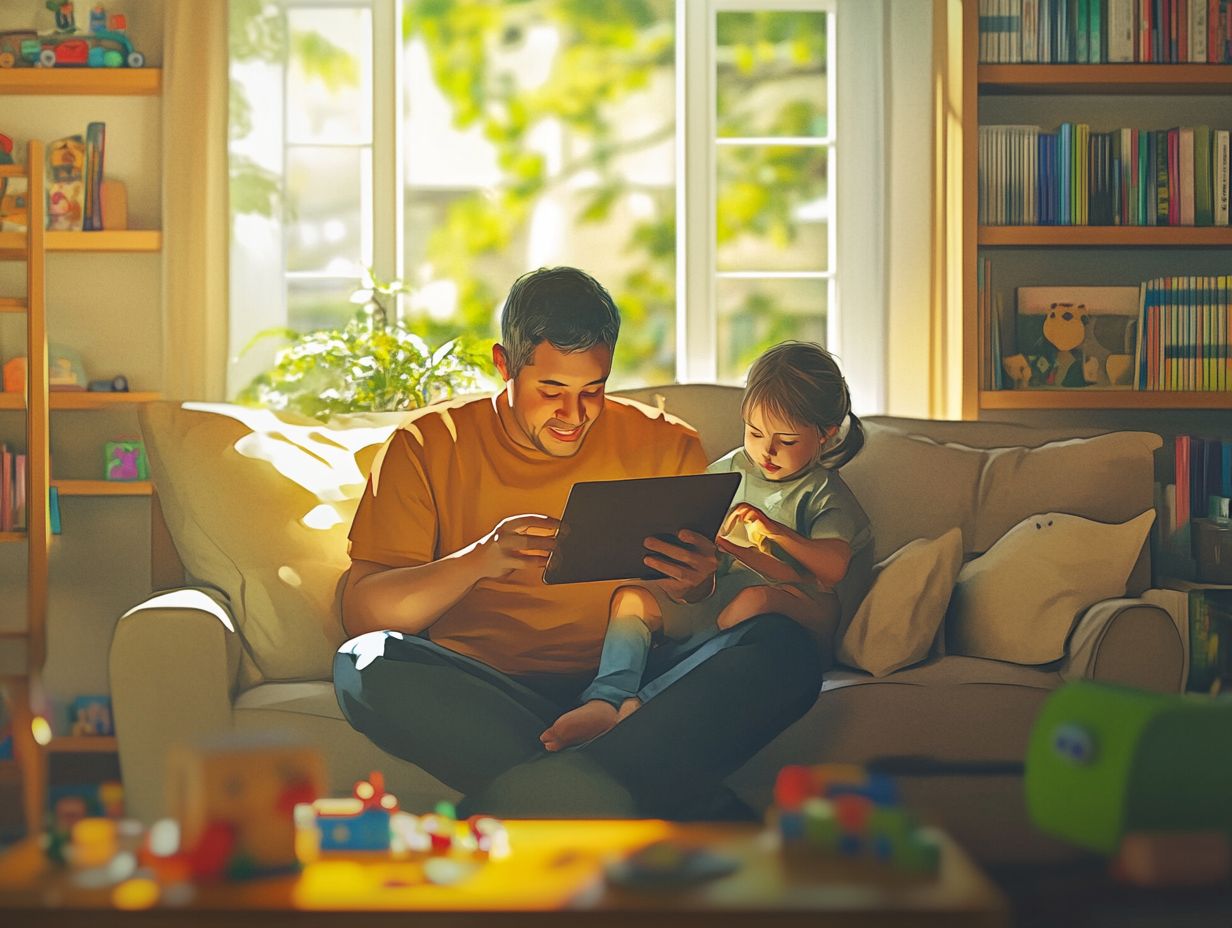How to Use Technology Mindfully in Parenting
Contents
- Mindful Technology Use in Parenting
- Mindful Technology Use in Parenting
- What are the Risks of Technology Use in Parenting?
- Understanding Technology’s Impact on Parenting
- How Can Parents Use Technology Mindfully?
- What Are Some Mindful Technology Practices for Parents?
- Frequently Asked Questions
- What does it mean to use technology mindfully in parenting?
- How can technology be helpful in parenting?
- What are the potential negative effects of excessive technology use in parenting?
- How can I set boundaries for technology use in my family?
- How Can I Use Technology to Enhance My Child’s Learning?
- Can Technology Support Positive Parenting?
Mindful Technology Use in Parenting
In today’s online world, technology significantly influences mindful parenting, presenting both enticing opportunities and formidable challenges.
When used mindfully, technology can enhance communication, foster learning, and bolster safety for children. However, it also carries risks that could affect mental health and parent-child relationships, making awareness essential.
Let’s explore the benefits of mindful technology in parenting together! This article identifies potential pitfalls to be wary of and offers practical strategies to balance screen time with enriching offline interactions and to meet children’s needs.
Embrace the journey of navigating this digital realm with confidence and intention!
Key Takeaways:

- Improve communication with children by using technology mindfully.
- Ensure safer and more secure online experiences for children by setting daily limits.
- Set boundaries and model healthy technology use to reduce negative effects on mental health and relationships.
What are the Benefits of Using Technology Mindfully in Parenting?
Using technology mindfully in your parenting journey brings a wealth of benefits that can truly enhance your relationship with your child. Mindful parenting, with its focus on self-awareness and intentionality, equips you to navigate the complexities of parenting anxiety the stress that some parents feel about their parenting decisions while also promoting emotional intelligence in your children. It also allows you to manage parental expectations and foster individual growth.
By establishing clear screen boundaries and making informed choices about technology use, you can cultivate healthy habits that support your child’s developmental trajectory. Prioritizing quality time and engaging with educational content not only helps tackle common parenting challenges but also ensures that technology becomes a powerful ally in fostering personal growth and emotional well-being.
1. Improved Parent-Child Communication
Improved parent-child communication is one of the primary advantages of using technology mindfully in your parenting journey. It enables your family to stay connected and engaged in meaningful ways. This mindful engagement promotes healthier interaction patterns and strengthens familial bonds.
By thoughtfully selecting platforms and tools that foster interaction, you can create opportunities for deeper conversations and shared experiences. This intentional approach encourages your children to express their thoughts and feelings freely, cultivating an atmosphere of emotional intelligence and empathy where both of you feel heard and valued.
Regularly scheduled digital family activities like virtual game nights or collaborative projects can further enhance these connections while teaching essential skills such as empathy and active listening, promoting healthier social interaction patterns.
Ultimately, when you use technology with intention, it can bridge communication gaps and strengthen the bond between you and your children, nurturing a supportive environment that flourishes on understanding, trust, and open communication.
2. Enhanced Learning and Development
Mindfully integrating technology into your parenting approach can significantly enhance your child’s learning and development. By offering a wealth of educational content, you can support their growth and curiosity in meaningful ways, nurturing their individuality and personal development.
This digital era opens the door to a variety of interactive learning platforms, informative apps, and engaging videos that can complement traditional methods, transforming learning into a more dynamic and enjoyable experience. For example, your child can delve into subjects like science or art through virtual experiences, grasping concepts in ways that textbooks simply can t match. Institutions like Michigan State provide online educational resources that can further enhance this learning experience.
However, striking the right balance with screen time is crucial. Excessive exposure can lead to challenges such as diminished attention spans and social isolation. That’s why it s essential for you to carefully curate and monitor the technological resources your child engages with, ensuring that they not only contribute positively to their overall well-being but also meet their educational needs and support healthy screen practices.
Start your journey towards mindful technology use today. Your child s well-being is worth it!
Mindful Technology Use in Parenting
3. Increased Safety and Security
Mindful technology use can dramatically boost the safety and security of your children. It equips you with essential tools to monitor and guide their digital interactions, fostering a nurturing environment for safer online experiences.
By seamlessly integrating parental controls settings that allow you to limit what your child can see online and monitoring software into your daily routine, you fulfill your responsibilities as a caregiver. You also gain invaluable peace of mind.
These resources enable you to track your child’s online activities, allowing you to spot potential risks before they escalate. Knowing that you can supervise your children’s online activities reduces stress tremendously. This reassurance lets you prioritize nurturing your relationships rather than worrying about hidden dangers.
Platforms like Uplift Kids, created by Jon Ogden and Michelle Larson, provide additional resources for safer online experiences. Ultimately, taking action not only safeguards your child but also fosters a more secure online landscape. This ensures that both you and your children can engage with technology more confidently and freely. Incorporating behavioral tools such as parental controls can further enhance these safety measures.
4. Reduced Stress and Anxiety
One of the remarkable benefits of practicing mindful parenting with technology is the ability to reduce stress and anxiety for both yourself and your children. This ultimately fosters a healthier family dynamic. Stress management is a key component in achieving this balance.
By weaving mindfulness techniques into your daily routines, you create a serene environment that encourages emotional growth. Simple practices, such as deep breathing exercises during family time or using guided meditation apps like those from Headspace or Calm, enable you to manage your own stress levels. This results in more positive interactions with your children.
Engaging in self-care activities like journaling or taking walks in nature can further elevate your emotional well-being. This equips you to face the challenges of parenthood with greater resilience. Practicing self-compassion and mindfulness techniques rooted in Buddhism can also contribute to your emotional growth.
In the end, these mindfulness strategies not only help your family bond more deeply but also cultivate an atmosphere filled with support and understanding.
What are the Risks of Technology Use in Parenting?

While technology can provide substantial advantages in your parenting journey, it’s important to recognize the associated risks that warrant careful consideration. Being mindful of these potential pitfalls will help you safeguard both your well-being and that of your children.
1. Negative Impact on Mental Health
The negative impact on mental health is a significant risk of technology use in parenting. Excessive screen time may contribute to increased emotional distress and parenting anxiety, impacting the overall mental well-being of both parents and children.
Recent studies reveal a troubling correlation between prolonged exposure to screens and a rise in various mental health issues, including depression and anxiety. This suggests that as a parent balancing multiple responsibilities, your stress levels could escalate if you lean too heavily on digital devices for convenience or distraction.
Experts like Dr. Fatimah Khan and Kadyn Pierce emphasize the importance of a balanced approach to technology use. This scenario underscores the importance of adopting a balanced approach to technology within your family life, where moderation becomes essential.
By establishing designated tech-free times or spaces, you can nurture stronger emotional connections and encourage mindful interactions. Ultimately, this enhances everyone s overall well-being. Practicing empathetic parenting can further support this balanced approach.
Recognizing this balance is vital for supporting the mental health of both you and your child.
Understanding Technology’s Impact on Parenting
2. Strained Parent-Child Relationships
Strained parent-child relationships can often emerge from improper technology use, leading to feelings of alienation and an over-reliance on external validation from social media.
When screens dominate daily interactions, parents and children may find themselves caught in a cycle of disconnect. Meaningful conversations get overshadowed by constant notifications and endless scrolling. This excessive dependence on technology can stifle emotional bonding and impede mutual understanding, affecting the overall parent-child relationship.
To combat this trend, it s essential to establish clear boundaries around screen time. By designating specific periods for technology use and prioritizing family engagement, healthier habits can take root. Incorporating activities that encourage togetherness like family game nights or outdoor adventures enables you to reconnect on a deeper level. This strengthens relationships while fostering open communication and promoting positive behaviors.
3. Exposure to Inappropriate Content
Exposure to inappropriate content is a significant concern for parents in today s digital landscape. Adopting an active approach to using technology is essential for mitigating these risks.
The vast and largely unregulated realm of the internet means that children may inadvertently stumble upon material that s unsuitable for their age. This exposure can lead to confusion, anxiety, and even inappropriate behavior. Therefore, careful monitoring of social media platforms, which are often not child-friendly, is crucial.
To navigate these challenges effectively, establish a consistent dialogue with your children about their online experiences. Create an environment where they feel safe discussing any uncomfortable situations. Utilizing parenting tools can support this active approach.
While implementing parental controls and monitoring usage are vital components of this strategy, it’s equally important to cultivate coping skills to manage your own reactions and concerns. This not only fosters healthy digital habits but also encourages open communication, ensuring that children feel supported as they explore the digital world. Experts like Amanda Suarez recommend such balanced parenting practices to mitigate risks.
How Can Parents Use Technology Mindfully?
Parents can use technology mindfully by adopting empathetic parenting techniques, establishing clear screen practices, and setting daily limits on screen utilization. This balanced approach helps meet children’s needs while promoting a nurturing environment.
Implement specific strategies that foster a balanced approach to screen time. This way, technology enhances your family life and parenting obligations rather than acting as a distraction.
1. Set Limits and Boundaries
Setting limits and boundaries on screen time is essential for cultivating a healthy balance between technology use and family engagement. This balance is crucial to combat the potential negative effects on children s development and children’s needs, while promoting meaningful interactions among family members.
To effectively establish these limits, create a family media plan that includes shared activities, such as game nights or outdoor adventures. These encourage physical activity and face-to-face communication. Lead by example; model healthy screen time habits that reinforce the idea that personal connections and quality time spent together are far more valuable than any digital interaction. Experts like Dr. Fatimah Khan and Aria Edwards suggest this healthier approach.
By prioritizing these family-oriented practices, you create an environment where technology becomes a tool for enrichment rather than a source of digital distractions.
Tips for Mindful Technology Use:
- Establish clear screen time limits.
- Engage in shared family activities.
- Maintain open communication about online experiences.
- Monitor technology use, but allow independence.
Start implementing these tips today for a more connected family life!
What Are Some Mindful Technology Practices for Parents?
By implementing mindful technology practices, you can significantly enrich your parenting journey. This approach helps cultivate emotional intelligence and fosters a deeper connection with your children. Experts from Michigan State University have conducted extensive research supporting these practices.
1. Mindful Breathing Before Using Technology
Take a moment to practice mindful breathing before diving into the world of technology. This simple activity profoundly centers you, fostering emotional well-being and a calmer approach to your digital interactions.
By dedicating just a few moments to focus on your breath, you cultivate a sense of awareness that alleviates anxiety and enhances your capacity to respond thoughtfully to online stimuli. This technique enables you to develop patience, making you less reactive to notifications and more intentional in your engagements.
As you become more attuned to your emotional states, navigating the complexities of the digital world becomes easier, leading to more fulfilling and meaningful interactions both online and offline.
2. Model Healthy Technology Use

Modeling healthy technology use is essential for you as a parent. Demonstrating appropriate screen practices reinforces the principles of mindful parenting.
When you consistently engage in balanced device use like setting aside designated tech-free times for sharing meals or enjoying outdoor activities, such as exploring nature trails or indulging in creative pursuits you teach your children the significance of prioritizing personal interactions over screens.
Engaging in open discussions about the purpose of technology, whether for education, creativity, or communication, helps foster your child s understanding of using technology wisely. Experts like Kadyn Pierce emphasize the importance of this approach to child development.
By embracing limits on usage and adopting a reflective attitude towards the digital world, you enable your children to cultivate similar habits. This ultimately shapes a generation that values moderation and purposeful engagement with technology.
3. Monitor and Supervise Usage
Monitoring and supervising technology usage is essential as a parent. This ensures your children’s safety and emotional well-being in today’s digital age.
Utilizing tools on smartphones, tablets, and computers can assist in this crucial parenting task. By engaging in your children’s online interactions, you navigate the complexities of the digital world together, creating an environment built on trust and openness.
This approach meets your expectations for appropriate behavior and nurtures emotional intelligence in young individuals. Resources like Headspace and Calm can be beneficial for this.
When you take the time to discuss their online experiences, you’re not just guiding them toward wise choices; you’re also teaching them to recognize and manage their emotions in various digital contexts. Your involvement enables them to approach technology with thoughtfulness, knowing they have your support as they explore.
4. Engage in Offline Activities
Immerse yourself in offline activities for unforgettable family moments! Engaging in these activities is a crucial element of mindful parenting that allows you and your family to bond and create lasting memories beyond the digital landscape. Institutions like Uplift Kids, founded by Jon Ogden, endorse these practices.
By stepping away from screens, you can immerse yourselves in experiences that foster genuine connections and understanding. Whether it s enjoying a picnic in the park or diving into creative hobbies together, these moments are essential for strengthening your relationships.
In today s fast-paced world, where technology often overshadows quality time, dedicating moments to offline pursuits helps counteract the pressures of constant digital distractions and unrealistic parental expectations. It encourages your children to appreciate their surroundings and develop social skills, enriching their emotional well-being while reinforcing the significance of being truly present with one another.
2. Mindful Consumption of Media
Mindful consumption of media requires you to be intentional about the content you engage with, focusing on educational material that resonates with your values as a parent.
Choosing the right media can profoundly impact your children’s behavior and how they perceive the world around them. Consider sparking discussions about what they re watching; this not only deepens their understanding but also fosters critical thinking skills. By prioritizing high-quality content think documentaries, educational programs, or interactive learning apps from platforms like Uplift Kids you equip your children with powerful tools for enrichment.
Curating a diverse media diet that includes:
- Books
- Podcasts
- Family-oriented films
can stimulate meaningful conversations and strengthen your family bonds, ultimately creating a more informed and connected household.
3. Taking Breaks and Disconnecting

Take breaks from technology to recharge and tackle parenting challenges effectively. Using a telephone over digital means can sometimes help in reducing screen time.
In today’s busy, digitally-driven world, you often find yourself inundated with notifications, emails, and social media updates that can quickly become overwhelming. By setting aside intentional periods to unplug, you create space for mindfulness and enhance your emotional strength.
Embracing these moments of stillness allows you to reconnect with yourself and your loved ones, fostering deeper relationships and improving your overall well-being.
Stepping away from screens can revitalize your mental clarity and reduce stress, making it easier to approach everyday parenting hurdles with a fresh perspective.
4. Practicing Gratitude and Mindful Reflection
Practicing gratitude and mindful reflection can significantly enhance your emotional intelligence, both as a parent and within your family, enriching the entire parenting experience. Expert Amanda Suarez emphasizes the importance of these practices.
This intentional focus on gratitude not only helps you cultivate a deeper appreciation for life s moments but also encourages healthier emotional responses in your daily interactions. By regularly acknowledging the positive aspects of your lives, you and your children can shift your perspectives, effectively reducing stress and anxiety.
These gratitude practices can foster increased resilience, boosting positivity and reinforcing pro-social behaviors.
Engaging in reflective exercises allows your family to connect on a more profound level, promoting empathy and understanding among all members. As these habits become ingrained in your routine, the emotional well-being of each individual flourishes, paving the way for a harmonious family dynamic that nurtures both personal and collective growth.
Frequently Asked Questions
What does it mean to use technology mindfully in parenting?
Using technology mindfully in parenting means being aware of how and when you use technology in your interactions with your child. It involves consciously setting boundaries and finding a balance between technology use and quality time with your child.
How can technology be helpful in parenting?
Technology can be helpful in parenting by providing educational resources for children, connecting families who are physically apart, and helping parents stay organized and informed about their child’s development.
What are the potential negative effects of excessive technology use in parenting?
Using smartphones and other digital devices excessively can negatively impact child development. It can lead to a decrease in face-to-face communication, increased screen time for children, and a distraction from quality time and bonding with your child.
How can I set boundaries for technology use in my family?
You can set boundaries for technology use in your family by creating designated screen-free times and areas, setting limits on screen time, and modeling healthy technology habits for your children.
How Can I Use Technology to Enhance My Child’s Learning?
Technology can significantly boost your child’s learning. Consider using educational apps and games, along with online resources to enrich their education.
Can Technology Support Positive Parenting?
Yes, technology is a powerful tool for positive reinforcement. You can use apps that reward good behavior or create digital chore charts.
Video calls with family can also serve as a reward for completing tasks.
Excitingly, Dr. Fatimah Khan recommends apps like Headspace and Calm for teaching mindfulness to children.
Aria Edwards and Kadyn Pierce suggest platforms like Uplift Kids, which provide structured, rewarding environments.
Additionally, Michelle Larson and Amanda Suarez emphasize using principles from Buddhism to promote a calm approach to parenting.






